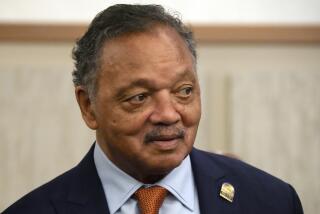Leader of Black Power Group in South Africa to Study in U.S.
- Share via
JOHANNESBURG, South Africa — The president of the black consciousness Azanian People’s Organization, which has been strongly critical of American policies in southern Africa, said Tuesday that he is giving up his post to study in the United States.
Saths Cooper, 36, who for 15 years has been one of South Africa’s most prominent anti-apartheid activists and a leading advocate of black power, said the government has given him a passport after refusing since 1968 to allow him to travel abroad.
Although one of the sharpest critics here of the Reagan Administration’s policy of “constructive engagement” with Pretoria, Cooper has received a Fulbright scholarship from the U.S. government to study clinical psychology at Boston University, where he hopes to obtain a doctorate through research on the impact of political violence on black children in South Africa.
To counteract suggestions that Cooper, a charismatic and eloquent leader, has “sold out,” or that it was about to disband, the Azanian People’s Organization issued a statement denouncing the United States as “imperialistic and capitalistic” and an “ardent supporter” of South Africa’s white-led minority government and its “racist policies.” But it accepted Cooper’s decision, the group added.
Not Regarded as a Betrayal
“We do not regard it as a betrayal of our ideals because he is going to the United States as an individual to study further,” a spokesman, Muntu Myeza, told a press conference.
Nevertheless, Myeza said, Cooper would not speak for the socialist black power group in the United States.
Cooper was an early follower of black consciousness leader Steve Biko, who died while in police custody in 1976. He also helped to introduce South African blacks to the writings of Malcolm X, the assassinated Black Muslim leader, and Stokely Carmichael, one of the major theoreticians of the American black power movement in the 1960s. Cooper helped found the black consciousness South African Students Organization and the Black People’s Convention, both now banned.
Cooper was detained without charge for two years in 1974. He was then jailed for six years after being convicted of terrorism in 1976 for organizing a rally to celebrate the defeat of Portuguese colonialists in neighboring Mozambique and the formation of a majority government there under the Front for the Liberation of Mozambique. He was detained without charge again at the start of the current state of emergency in June and released in August.
More to Read
Sign up for Essential California
The most important California stories and recommendations in your inbox every morning.
You may occasionally receive promotional content from the Los Angeles Times.












